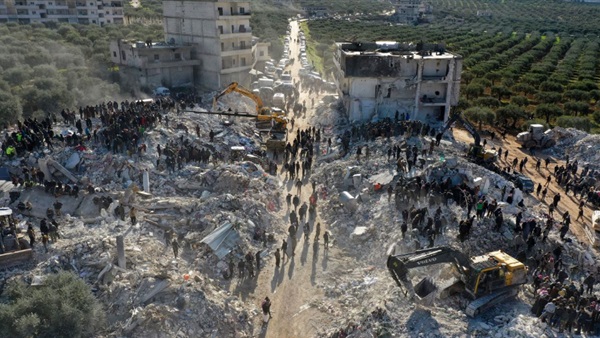Turkey, Syria coordination more likely after latest quake – observers

The latest Kahramanmaras earthquake in southern Turkey and
north-western Syria has left thousands of people dead behind in both countries.
The 7.8 magnitude quake took place on February 6. It also
left a large number of people on both sides injured and devastated thousands of
homes and facilities.
Dozens of countries are harrowing to deliver aid to the two
countries.
The same development is opening up the prospect of a meeting
between Turkish President Recep Tayyip Erdogan and Syrian President Bashar
al-Assad.
Before the tragedy struck, there were attempts already to
bring the two sides closer together, with some countries mediating between
Ankara and Damascus.
However, the same attempts were far from successful.
Erdogan-Assad meeting
It should be noted that relations between Syria and Turkey
have cooled since the outbreak of the civil war in Syria in 2011.
Assad's regime has always appealed to Turkey to stop
supporting Syrian opposition forces and agree to the normalization of
relations.
Nevertheless, all these appeals have so far fallen into deaf
ears.
Now, however, some observers believe the seismic shock that
hit the two countries can affect the dynamics of relations between them.
The same shock, they say, can change the map of the conflict
in Syrian territories, on the one hand, and resolve the crisis of Syrian
refugees in Turkey, on the other.
This is especially true, they say, with presidential
elections approaching in Turkey.
The same observers believe that ending strains in relations
between Turkey and Syria would serve Erdogan's best interests, thwart attempts
by the Turkish opposition to mobilize public opinion against the Turkish
president, against the background of the Syrian refugees' crisis.
Russia made attempts to bring Erdogan and Assad to the same
table.
Following the quake, the Russian Research and Studies Centre
published several messages on its official Telegram page, in which it called on
the leaders of the two stricken countries to seize the current opportunity and
hold a meeting, especially in the light of the current state of Arab and
international solidarity for their countries.
Some observers even suggested that the phone talks Russian
President, Vladimir Putin and Erdogan held in the aftermath of the quake had
dealt with this issue.
Opening border crossing
Discussions on the possibility of reopening the border
crossing between Hatay Province in Turkey and the Syrian government-controlled
part of Latakia Province to ease the entry of aid to affected areas in Syria,
after a decade of closure, can be the basis of a new chapter in relations
between the two countries, a Turkish official told Reuters on February 10.
The shift in the Turkish position towards Syria finds its
roots in attempts by the international community to extend a helping hand to
the Arab country, after the latest quake which left massive devastation in it.
Aid can only enter Syria through the Bab al-Hawa border
crossing with Turkey.
Nevertheless, some political experts ruled out the
possibility of the quake crisis changing the course of relations between the
two countries.
Erdogan, they said, has not reciprocated to demands by his
Syrian counterpart in relations to the Syrian opposition.
They added that the Turkish president did not show any
response to resolve the refugee crisis.
Purely pragmatic
Director of the Arab Centre for Political and Strategic
Studies, Mohamed Sadek Ismail, described Turkish policies as 'purely
pragmatic'.
This means, he said, if it were necessary for Erdogan to
meet his Syrian counterpart, he would do so, especially if this will serve his
interests in the northern part of Syria.
"The earthquake issue resulted in international
coordination between Turkey and the international system on humanitarian
assistance to the two stricken countries," Ismail told The Reference.
"Currently most of the aid has reached Turkey and has
not reached Syria, causing Ankara to distribute it to the stricken areas,"
he added.
He noted that this may lead to diplomatic coordination with
Syria to regulate the issue of aid.





